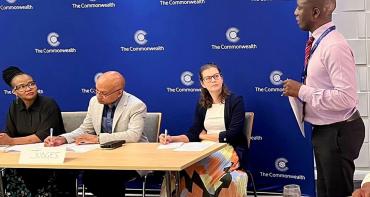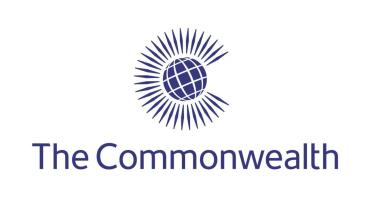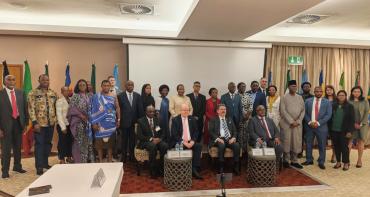More than 15 million people are eligible to vote by the close of polls on Thursday 18 February, in the country’s third major elections since the restoration of multi-party politics in 2005.

Commonwealth election observers are in Uganda for the 2016 presidential and parliamentary polls. More than 15 million people are eligible to vote in the country’s third major elections since the restoration of multi-party politics in 2005.
The Chair of the Commonwealth Observer Group, former President of Nigeria Olusegun Obasanjo, speaking at the opening of polling stations, urged all stakeholders to refrain from acts which could affect the peaceful and orderly conduct of the election. He also confirmed that an interim assessment of their observations will be issued on 20 February.
“Today is an opportunity for the people to exercise their democratic right and express their will through the ballot box. It is vitally important that all stakeholders respect the franchise and refrain from acts of violence and intimidation,” President Obasanjo stated.
“As Commonwealth observers, our role is to consider whether the election has been conducted credibly and transparently. We are looking not only at election day, but the whole electoral process, and whether it is compliant with both Ugandan’s laws and the international and regional standards to which the country has committed.”
He assured Ugandans that the Commonwealth’s assessment and report will accurately reflect the group's observations, insisting that all observers must “say it as you see it”. He added: “We are all men and women of integrity and I do not believe any of us would want to sacrifice his or her integrity on the alter of unnecessary convenience."
Commonwealth election observer teams are in Arua, Gulu, Kabale, Kampala, Jinja, Masindi, Mbale and Mbarara districts, where they are observing voting, counting and results processes at polling stations and counting centres.
On 17 February, as the teams met with local election officials and police representatives, President Obasanjo heard from the Electoral Commission and other local stakeholders about preparations for election day. One of the groups he met was the Women’s Situation Room, which is providing an early warning and conflict mechanism on election day.

Women's Situation Room, Uganda - 17 Feb
First formed for Liberia’s 2011 elections, the Women’s Situation Room has since been established for national polls in Senegal, Sierra Leone, Kenya, Malawi and Nigeria. In Uganda, it is formed of a coalition of three local organisations - Isis-WICCE, Forum for Women in Democracy and the Institute for Social Transformation and is operating in 15 districts, engaging women and young people to play an active role in preventing election violence.
President Obasanjo welcomed the efforts of the Women’s Situation Room and other citizen-led organisations “I want to take this opportunity to commend Ugandan civil society organisations,” adding: “Women are the peacemakers - we have a lot to learn from women.”
The Commonwealth Observer Group has been in Uganda since 11 February. The 13-strong team is vice-chaired by Senator Amos Wako, former Attorney-General of Kenya. The group has heard from political parties, citizen observer groups, human rights, gender and youth groups, as well as resident High Commissioners from Commonwealth countries.
The group’s eminent members include serving and former politicians, electoral commissioners, human rights, gender, youth and media experts, hailing from Australia, Bangladesh, Canada, Dominica, Ghana, India, Kenya, Nigeria, South Africa, St Vincent and the Grenadines, Saint Lucia, and the United Kingdom.
Notes to Editors
Social Media
Join the conversation online at #CommonwealthElections #UgandaDecides
Follow us: @commonwealthsec
Observers speak to local stakeholders about preparations for election day: https://t.co/2EF9sW4kmJ #ugandadecides pic.twitter.com/x46NL16DCh
— The Commonwealth (@commonwealthsec) February 18, 2016
#Commonwealth observers' role is to consider whole electoral process: https://t.co/2EF9sW4kmJ #UgandaDecides pic.twitter.com/64nutne6Nh
— The Commonwealth (@commonwealthsec) February 18, 2016



